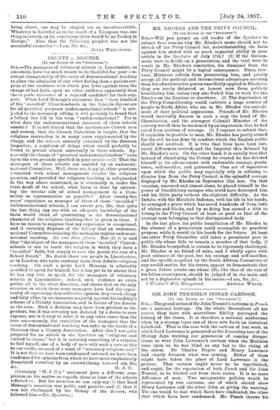MR. RHODES AND THE PRIVY COUNCIL.
[TO THE EDITOR OF THE " SPECTATOR:9
SIE,—Will you permit an old reader of the Spectator to submit four reasons why Mr. Rhodes's name should not be struck off the Privy Council list, notwithstanding the facts against him stated with so much impartial ability in your article in the Spectator of July 17th ? (1) If the Govern- ment were to decide on a prosecution, and the trial were to result in Mr. Rhodes's conviction, his dismissal from the Privy Council might be a logical consequence. Since, how- ever, Ministers refrain from prosecuting him, and quietly accept all the political and international advantages accruing from his administrative genius unselfishly applied in Rhodesia, they are surely debarred as honest men from publicly humiliating him, unless they also forbid him to work for the Empire on the Zambesi or elsewhere. (2) The deprivation of the Privy Councillorship would embitter a large number of people in South Africa who see in Mr. Rhodes the embodi- ment of their political aspirations. Friends of Mr. Rhodes. wouldinevitably discern in such a step the hand of Mr.. Chamberlain, and the strongest Colonial Minister of the century would thus be weakened by an imputation that he had acted from motives of revenge. (3) I venture to submit that, if expiation be possible to man, Mr. Rhodes has partly atoned for the evil he has done by conduct which the English public- should not overlook. It is true that lives have been lost,. racial differences revived, and the Imperial idea debased by Mr. Rhodes's acts. On the other hand, it is equally true that instead of abandoning the Colony he created he has devoted himself to its advancement with undeniable courage, persis- tence, self-sacrifice, and generosity. One act of reparation, upon which the public may especially rely in refusing to dismiss him from the Privy Council is the splendid courage displayed by Mr. Rhodes on September 21st last. On that occasion, unarmed and almost alone, he placed himself in the power of bloodthirsty savages who could have destroyed him and his little party without the slightest difficulty. At the Indaba with the Matabele Indunas, with his life in his hands, he arranged a peace which has saved hundreds of lives, both of whites and blacks, and by so doing has earned a title to belong to the Privy Council at least as good as that of the average man belonging to that distinguished body.
In the last place, the public humiliation of Mr. Rhodes in the absence of a prosecution could accomplish no practical purpose, while it would tie his hands for the future. At least one other Privy Councillor still takes a prominent part in public life whose title to remain a member of that body, it Mr. Rhodes be expelled, is certain to be vigorously challenged, Mr. Rhodes is no friend of mine, and I wholly agree with your estimate of the past, but his courage and self-sacrifice, and the specific acquittal by the South African Committee of any sordid motive for his errors, appear to demonstrate that a great future awaits one whose life, like that of the rest of his fellow-countrymen, should be judged of in the main, an& not by a deplorable episode in his career.—I am, Sir, &c.,
2 Windmill Hill, Hampstead. ARNOLD WHITE.


































 Previous page
Previous page